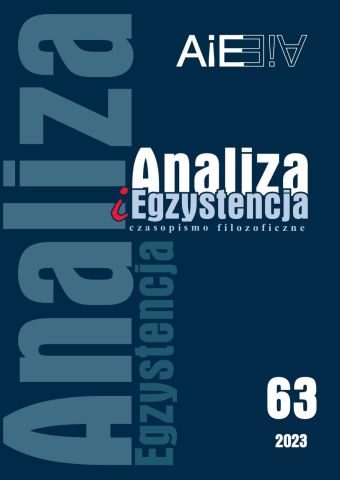
ISSN: 1734-9923
eISSN: 2300-7621
OAI
DOI: 10.18276/aie.2023.63-01





Lista wydań /
63 (2023)
Wittgenstein on Truth: Some Remarks on Paragraphs 134-137 of Philosophical Investigations
| Autorzy: |
Jan
Wawrzyniak

Uniwersytet Pedagogiczny w Krakowie |
| Słowa kluczowe: | Wittgenstein truth predicate grammatical investigations |
| Data publikacji całości: | 2023 |
| Liczba stron: | 22 (5-26) |
Abstrakt
The main aim of this text is to explicate what paragraphs 134-137 of Philosophical Investigations say about truth. Nevertheless, I start with a discussion of the remarks on truth contained in the Tractatus because the thoughts expressed in the latter should be read in the context of the thoughts expressed in the former. According to my interpretation of paragraphs 134-137 of the Investigations, Wittgenstein aims to show that the relationship between the concept of truth and the concept of a proposition may consist in the fact that truth and falsity, in certain language games, are constitutive elements of what a proposition is, but it must be added that these concepts cannot be comprehended independently from each other. I also come to the conclusion that in his opinion the concept of truth is expressed in various ways in our language, it being conveyed by such expressions as “… is true” and “this is how things are: …”, and that this shows that while asserting that something is true one can emphasize, on the one hand, that it is a proposition that says that things are a certain way, and on the other, just the fact that things are thus and so.
Pobierz plik
Plik artykułu
Bibliografia
| 1. | Baker, G. P., Hacker, P. M. S. (2005). Wittgenstein: Understanding and Meaning, Volume 1 of An Analytical Commentary on the Philosophical Investigations. Part I: Essays. Oxford: Blackwell. |
| 2. | Bartunek, N. (2019). Truth in the Investigations. Synthese 196 (10), 4091-4111. |
| 3. | Blackburn, S. (1998). Symposium: realism and truth. Wittgenstein, Wright, Rorty, Minimalism. Mind, 107, (425), 157–181. |
| 4. | Bronzo, S. (2019). Demystifying Meaning in Horwich and Wittgenstein. In J. Conant, S. Sunday (Eds.), Wittgenstein On Philosophy, Objectivity, And Meaning (pp. 164-184). Cambridge: Cambridge University Press. |
| 5. | Davidson, D. (1967). Truth and Meaning. Synthese, 17, (3), 304-323. |
| 6. | Diamond, C. (2002). Truth before Tarski: After Sluga, after Ricketts, after Geach, after Goldfarb, Hylton, Floyd, and Van Heijenoort. In. E. H. Reck (Ed.), From Frege to Wittgenstein Perspectives on Early Analytic Philosophy (pp. 252-279). Oxford: Oxford University Press. |
| 7. | Diamond, C. (2003). Unfolding Truth and Reading Wittgenstein. Sats - Nordic Journal of Philosophy, 4 (1), 24–58. |
| 8. | Frascolla, P. (2017). The Role of the Disquotational Schema in Wittgenstein’s Reflections on Truth. Philosophical Investigations, 40 (3), 205-222. |
| 9. | Horwich, P. (1990). Truth. Oxford: Basil Blackwell. |
| 10. | Horwich, P. (2016). Wittgenstein on Truth. Argumenta 2 (1), 95-105. |
| 11. | Horwich, P. (2018). Wittgenstein on Truth and Meaning. Australasian Philosophical Review, 2:3, 285-298. |
| 12. | Horwich, P. (2012). Wittgenstein’s Metaphilosophy. Oxford: Oxford University Press. |
| 13. | Künne, W. (2003). Conceptions of Truth. Oxford: Oxford University Press. |
| 14. | McFarland, A. (2020). Wittgenstein and Redundant Truth. Philosophia 48, 1515-1525. |
| 15. | Prior, A. N. (1971). Objects of Thought. Oxford: Clarendon Press. |
| 16. | Quine, W. V. O. (1986). Philosophy of Logic. Cambridge, Mass: Harvard University Press. |
| 17. | Ramsey, F. P. (1927). Facts and Propositions. Proceedings of the Aristotelian Society, Supplementary Volumes, Vol. 7 (1), 153-170. |
| 18. | Stern, D. G. (2004). Wittgenstein's Philosophical Investigations: An Introduction. Cambridge: Cambridge University Press, |
| 19. | Strawson, P. F. (1971). Truth. In P. F. Strawson, Logico-Linguistic Papers. London: Methuen & Co, 190-213. |
| 20. | Tarski, A. (1944). The Semantic Conception of Truth. Philosophy and Phenomenological |
| 21. | Research 4, 341-376. |
| 22. | Vision, G. (2005). The Truth about Philosophical Investigations I §§134-137. Philosophical Investigations, 28, 159–176. |
| 23. | Wittgenstein, L. (1978). Philosophical Grammar. R. Rhees (Ed.), A. Kenny (Trans.). Berkeley and Los Angeles: University of California Press. |
| 24. | Wittgenstein, L. (2009). Philosophical Investigations. Transl. G. E. M. Anscombe, P. M. S. Hacker, J. Schulte. Chichester: Wiley-Blackwell. |
| 25. | Wittgenstein, L. (1991). Remarks on the Foundations of Mathematics. G. E. M. Anscombe, R. Rhees, and G. H. von Wright (Eds.), G. E. M. Anscombe, (Trans.) (revised edition). Oxford: Blackwell. |
| 26. | Wittgenstein, L. (1922). Tractatus Logico-Philosophicus. Transl. C. K. Ogden & F. P. Ramsey. London: Routledge and Kegan Paul. |
| 27. | Wittgenstein, L. (2001). Wittgenstein’s Lectures, Cambridge 1932-35. A. Ambrose (Eds.). New York: Prometheus Books. |